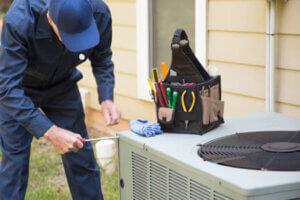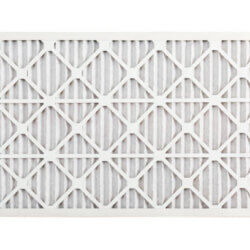
Experiencing an HVAC emergency can be stressful and uncomfortable, especially in a place like St. Louis, where the weather can be unpredictable. Whether a scorching summer day or a chilly winter night, a malfunctioning HVAC system can quickly turn your home into an inhospitable environment. Knowing how to respond promptly can save you time, money, and a lot of discomfort. Here’s a guide with emergency HVAC tips to help you easily navigate HVAC emergencies.
To learn more or if you need to schedule HVAC repair service for your home, Galmiche & Sons is here to help.
Emergency HVAC Tips: Steps to Take When Your HVAC System Fails
When your HVAC system suddenly stops working, the most important thing is knowing what to do and what not to do. Stay calm and take systematic steps to troubleshoot the issue.
1. Check the Thermostat: Ensure it’s set to the correct temperature and mode (heat or cool). Sometimes, the problem is as simple as a thermostat setting that’s accidentally been changed.
Learn about ensuring optimal thermostat settings for summer.
2. Inspect the Power Supply: Ensure circuit breakers have not tripped. Often, an HVAC system stops functioning due to power issues, which can be quickly resolved by resetting the breaker.
Learn more about what to do if your AC is tripping the circuit breaker.
3. Examine the Air Filter: A clogged air filter can cause your system to stop working efficiently. Once it’s clogged, airflow is restricted, and this can cause the system to overheat and shut down.
Learn more about HVAC air filters and how to avoid common problems.
4. Listen for Weird Noises: Any bangs, clanks, or whirring could suggest a mechanical failure or debris in the system. While you can’t fix these noises yourself, identifying them helps Galmiche & Sons technicians address the issue faster.
Learn about unusual noises coming from your ductwork
Emergency HVAC Tips: How to Identify HVAC Emergencies
Certain situations require immediate attention, so knowing how to identify genuine HVAC emergencies can be crucial. Some warning signs you need HVAC repair include:
- No Heat or Cooling: In extreme weather conditions, an HVAC failure can become an emergency due to health and safety concerns, especially for children, the elderly, and pets.
- Strange Odors: A burning smell may indicate electrical problems, while a musty odor might suggest mold. Either should be addressed immediately.
- Unresponsive System: If your HVAC system doesn’t react to thermostat changes, it could signal an internal failure or wiring problem.
- Water Leaks: Any water pooling around your furnace or air conditioning unit can indicate leaks, which need quick attention to prevent further damage.
Learn more about choosing the right St. Louis HVAC Professional for emergency repairs.
Emergency HVAC Repair Tips
For those comfortable with a bit of DIY, there are some minor fixes you might consider attempting before professionals arrive:
- Replace or Clean Filters: A clogged filter is often the culprit behind airflow issues. Regular replacement or cleaning can provide an instant, sometimes temporary, fix.
- Defrost Coils: Frozen coils can prevent an HVAC from working properly. Turn off the system, allow it to defrost naturally, and then restart.
- Reset the System: Simply turning the system off and on again can sometimes clear minor faults. Make sure to wait a few minutes before switching it back on.
Learn more about the DIY HVAC maintenance tasks and repairs you can handle.
When to Call for Emergency HVAC Services
After you’ve done a few basic checks, it is wise to reach out to a professional, especially if:
- There’s no improvement after your troubleshooting efforts.
- You hear hissing sounds that might indicate a refrigerant issue.
- There’s a persistent burning smell, suggesting serious electrical issues.

For emergency services in St. Louis, contact Galmiche & Sons.
Learn more about DIY HVAC repairs vs. contacting a professional and get our tips on What to do When You Need Emergency Furnace Service Over the Holidays or Weekend.
Preventing HVAC Emergencies with Regular Maintenance
While these emergency HVAC tips are helpful, prevention is always better than cure. Regular HVAC system maintenance is crucial. Here’s what you can do:
Schedule Regular Maintenance
Inspecting your HVAC system before extreme seasons — typically in spring and fall — can prevent mid-season breakdowns. Learn how you can Reduce the Need for Emergency AC Repair Calls with Regular AC Maintenance.
Routine Filter Changes
Change filters every 1-3 months, depending on usage and manufacturer guidelines. Learn more about air filtration systems and how they keep your system running efficiently.
Clear Debris
To maintain optimal performance, keep outdoor units free from leaves, dirt, and debris. Learn more about AC Maintenance and How Dirt and Debris Can Affect Your Air Conditioner.
Contact Galmiche & Sons for HVAC Emergencies
By staying proactive and prepared with these emergency HVAC tips, you can significantly reduce the chances of experiencing HVAC emergencies. Regular maintenance not only extends the life of your system but also ensures that it runs efficiently, saving you money in the long term.
Get in touch with Galmiche & Sons for any HVAC emergencies, anytime or to schedule your regular HVAC maintenance. You may also contact us for more emergency HVAC tips.









